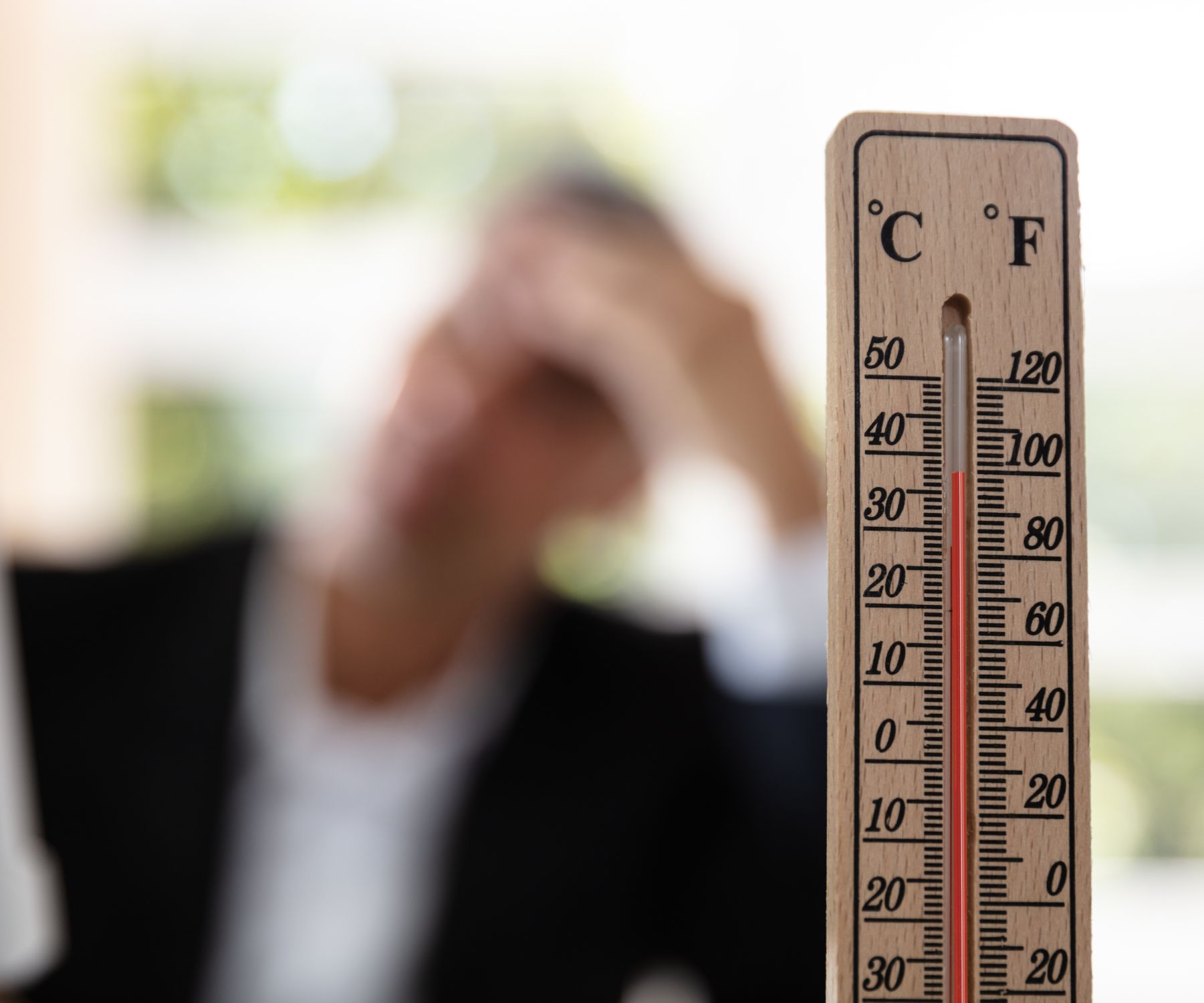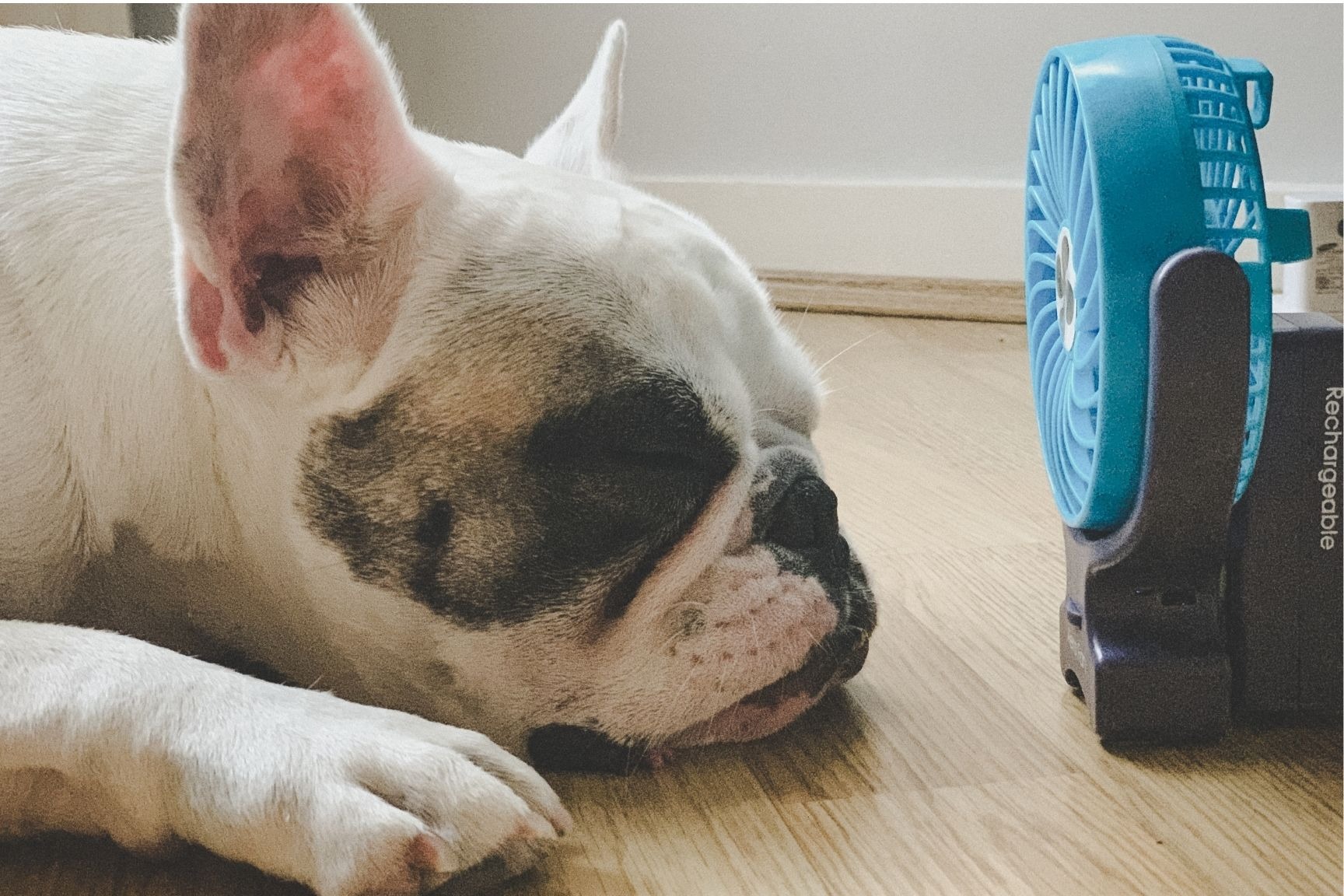Table of Contents
The AC-Sore Throat Connection:
 Air conditioning is a lifesaver during scorching summers. It cools down our homes and offices, and provides relief from the relentless heat.
Air conditioning is a lifesaver during scorching summers. It cools down our homes and offices, and provides relief from the relentless heat.
Yet, it can come with a hidden cost.
Many of us don’t realize that the cool air blasting from our AC units can also lead to health issues. Sore throats are a common complaint.
The link between air conditioning and sore throats is not immediately obvious to everyone. However, understanding this connection is the first step toward finding solutions. It’s a trade-off that needs careful consideration, especially since its hard to go without air conditioning in the middle of summer.
Why does AC give me a sore throat?
Air conditioning, while a refuge from the heat, can also have unintended side effects.
1. Dry Air. While it cools, it also dehumidifies the air, often leading to a noticeable dryness. This lack of moisture can make your throat feel dry, sore, and uncomfortable.
2. Mold In another twist; the very device keeping you cool can harbor mold within its damp internal components. When the AC unit kicks in, it might circulate mold spores along with the cool air, adding insult to injury for your throat.1
Identifying Your Symptoms:
To navigate these waters, it’s crucial to pinpoint what’s causing your discomfort. If it’s dry air you’re battling, your throat might feel scratchy and parched, especially after a night in an air-conditioned room.
Mold exposure, on the other hand, could bring about a more persistent sore throat, often accompanied by other allergic reactions like sneezing or itchy eyes. Noticing a musty odor when your AC is running can also be a telltale sign of mold.
Symptoms Comparison Table:
| Symptom | Dry Air from AC | Mold Exposure |
|---|---|---|
| Sore Throat | Common | Common |
| Dry Skin | Likely | Less likely |
| Itchy Eyes | Less likely | Likely |
| Musty Odor | No | Yes |
| Persistent Cough | Possible | Likely |
| Sneezing | No | Likely |
| Respiratory Issues | Less likely | Likely |
| Visible Mold | No | Possible |
Immediate Relief Strategies:
Once you’ve got a handle on what’s troubling your throat, it’s time for some quick fixes:
- Hydration is Key: Drink plenty of fluids to keep your throat moist and alleviate dryness.
- Humidify Your Space: Introducing a humidifier can add back some of the moisture stripped away by your AC, offering relief for your dry throat.
- Saltwater Gargles: A simple saltwater gargle can soothe your throat and reduce irritation.
- Lozenges: Throat lozenges can provide temporary relief by increasing saliva production to moisten your throat.
- AC Adjustment: Consider tweaking your AC settings, opting for a less intense cooling effect to mitigate the dryness.
| Relief Method | Action | Expected Outcome |
|---|---|---|
| Hydration | Drink plenty of water and fluids. | Helps to moisten the throat and reduce dryness. |
| Humidification | Use a humidifier in your living space. | Adds moisture to the air, alleviating throat dryness. |
| Saltwater Gargle | Gargle with a warm saltwater solution. | Soothes throat irritation and reduces inflammation. |
| Throat Lozenges | Suck on throat lozenges or hard candies. | Stimulates saliva production, keeping the throat moist. |
| Adjust AC Settings | Increase the temperature slightly. | Reduces the drying effect of the AC on the air. |
| Take Breaks | Spend some time in non-air-conditioned spaces. | Allows your throat to recover from the dry air. |
| Air Circulation | Ensure proper air circulation in the room. | Prevents cold air from directly hitting your throat. |
How Long Does a Sore Throat from Air Conditioning Last?
Typically, if the sore throat is solely due to the dry air from AC, you might expect relief within a few days of implementing immediate relief measures, such as staying hydrated, using a humidifier, and avoiding prolonged exposure to cold, dry air.
For cases where mold allergens contribute to the sore throat, the discomfort might persist longer and could require addressing the mold issue directly within the AC system to see a significant improvement. In such scenarios, alongside the immediate relief measures, thorough cleaning of the AC unit and possibly consulting a professional for a more in-depth inspection might be necessary.
If your sore throat lingers beyond a week despite taking these steps, or if it’s accompanied by other symptoms like fever, rash, or severe pain, it’s wise to consult a healthcare professional.2
To ensure your throat doesn’t become a repeat victim of the air conditioning’s chill, adopting a proactive approach is crucial.
Let’s explore how you can prevent sore throats by tackling the root causes: dry air and the hidden menace of mold in your AC system.
Tackling Dry Air:
The key to combating the dryness associated with air conditioning lies in managing your indoor humidity levels effectively.
- Humidity Levels: Aim to maintain indoor humidity between 30% and 50%. This range helps prevent the air from being too dry or too moist.
- Use a Humidifier: Deploying a humidifier can reintroduce the necessary moisture back into your environment, especially in areas frequently cooled by AC.
- Indoor Plants: Consider adding indoor plants that can naturally increase humidity levels, though be mindful of overwatering and potential mold growth in the soil.
Addressing Mold in AC Units:
Preventing mold growth within your air conditioning system is equally important for safeguarding your throat’s well-being.
- Regular AC Maintenance: Ensure your AC unit is cleaned and serviced regularly. This includes changing filters, cleaning ducts, and checking for any signs of moisture or mold buildup.
- Dehumidifiers Near AC Units: In humid climates, using a dehumidifier in conjunction with your AC can help reduce the overall moisture level, making it less hospitable for mold.
- Proper Ventilation: Ensure your space is well-ventilated. Using exhaust fans in kitchens and bathrooms and occasionally opening windows can help reduce humidity levels and prevent mold growth.
Advanced Solutions:
For those looking for an extra layer of protection, consider more advanced solutions.
- In-Duct Air Purifiers: Installing an in-duct air purifier within your HVAC system can help filter out mold spores, dust, and other allergens before they circulate through your home. RGF is one of the best. But a little pricy. Air Health Haven has a comparable product that is better priced,
- AC Upgrades: If your AC unit is older and prone to mold issues, upgrading to a newer model with better moisture control and filtration systems might be a worthwhile investment.
Even with all the right precautions, sometimes a sore throat might persist or the air quality issues in your home may not resolve as expected. In such cases, knowing when and how to seek professional help is crucial.
Consulting Healthcare Professionals:
If your sore throat becomes a frequent issue or is accompanied by other symptoms like fever, prolonged discomfort, or severe allergic reactions, it’s time to consult a healthcare professional. They can offer:
- Personalized Medical Advice: Based on your symptoms and medical history, to address the root cause of your sore throat.
- Allergy Testing: To determine if specific allergens might be contributing to your discomfort.
- Treatment Plans: Including medications or therapies to alleviate symptoms and address underlying conditions.
Professional HVAC Assistance:
For persistent issues related to air quality or suspicions of mold in your AC system that you can’t resolve on your own, seeking help from HVAC professionals is a smart move. They can provide:
- In-depth Inspections: To identify and rectify mold, dust, or other contaminants within your HVAC system.
- Professional Cleaning: Thorough cleaning of ducts, filters, and AC units to remove allergens and prevent mold growth.
- System Upgrades or Repairs: Recommendations for upgrading your AC system or making necessary repairs to improve indoor air quality.
 Final Thoughts:
Final Thoughts:
Tackling sore throats from air conditioning involves a blend of immediate relief efforts, preventative measures, and sometimes professional intervention. By staying proactive about indoor air quality and consulting experts when needed, you can enjoy the cool comfort of your AC without the downside of throat discomfort.
Remember, the goal is not just to treat the symptoms but to create a healthy and comfortable indoor environment that supports your overall well-being. With the right strategies in place, you can keep your cool all summer long, sore throat-free.
Frequently Asked Questions
Can air conditioning cause a sore throat?
Yes, air conditioning can cause a sore throat due to dry air that it circulates and potential allergens like mold spores.
Why does my throat feel dry after sleeping with the AC on?
AC units reduce indoor humidity, leading to dry air that can make your throat feel parched, especially after prolonged exposure.
Is it unhealthy to sleep in an air-conditioned room?
Not necessarily, but maintaining a moderate temperature and ensuring your AC is clean can help prevent health issues like sore throats.
Can air conditioning make you sick?
Yes, if not properly maintained, AC can circulate dust, mold, and other allergens that can cause respiratory issues, including sore throats.
How can I prevent getting a sore throat from my AC?
Keep indoor humidity levels balanced, regularly clean your AC unit, and consider using a humidifier to add moisture back into the air.
What humidity level should I maintain indoors to avoid AC-related sore throats?
Aim for an indoor humidity level between 30% and 50% to prevent dry air and discourage mold growth.
Can mold in my AC be causing my sore throat?
Yes, mold growth in AC systems can release spores into the air, potentially causing sore throats and allergic reactions.
How often should I clean or replace my AC filters?
Check your AC’s manual, but generally, filters should be cleaned or replaced every 1-3 months, depending on usage and type.
What are the signs of mold in an AC unit?
Musty odors, visible mold growth, and increased allergy symptoms when the AC is on can all be signs of mold.
Can using a humidifier at night help prevent AC-induced sore throats?
Yes, a humidifier can help counteract the drying effect of AC by adding moisture to the air, reducing throat dryness.
Should I turn off my AC if I have a sore throat?
Not necessarily, but adjusting the temperature to a less cool setting and using a humidifier can help alleviate discomfort.
What kind of air purifier is best for use with an AC unit?
HEPA filters are effective for trapping dust and allergens, while UV light purifiers can help kill bacteria and mold spores.
Can changing the direction of my AC vents help prevent sore throats?
Yes, directing airflow away from direct contact with people can help reduce the direct drying effect on your throat.
Are there specific plants that can help improve indoor air quality with AC?
Plants like spider plants, peace lilies, and snake plants are known for their air-purifying qualities and can improve indoor air quality.
What should I do if cleaning and humidity control don’t improve my AC-related sore throat?
Consult a healthcare professional to rule out other causes and consider having an HVAC professional inspect and clean your AC system thoroughly.



 Final Thoughts:
Final Thoughts:





